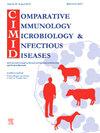Prevalence of coccidiosis in broiler chickens in Medea, Algeria
IF 2
3区 农林科学
Q4 IMMUNOLOGY
Comparative Immunology Microbiology and Infectious Diseases
Pub Date : 2025-02-07
DOI:10.1016/j.cimid.2025.102323
引用次数: 0
Abstract
This study, investigates the prevalence of Eimeria species in broiler farms in Medea, Algeria. A total of 200 samples were collected from 26 breeding farms across 07 regions in Medea, finding a prevalence rate of 100 %. Five Eimeria species were present in all broiler farms. The results indicated that most fecal samples contained multiple Eimeria species. The decreasing infection rates of Eimeria in the studied broiler farms were: E. Mitis (92,5 %), E. tenella (81 %), E. necatrix (76 %),E. maxima (38,5 %), E. brunetti (22 %),E. acervulina (00 %), and E. praecox (00 %). This indicates that E. mitis is the predominant species in the province of Medea.Histopathological examination of the intestines revealed destruction of epithelial cells caused by the development of the parasite's asexual stages, leading to errosive and hemorrhagic lesions throughout the entire intestine. The mucosa appeared denuded and disrupted, with intense inflammation extending from the lamina propria to the submucosa. Additionally, thickening of the muscularis mucosa was observed, along with broken or fused tips of the villi. These results indicated that the prevalence of coccidiosis is high among the broiler farms in Medea province, North of Algeria. As a conclusion, it seems that the epidemiological situation of poultry coccidiosis in Medea province must be taken into consideration in order to minimize the economic losses caused by this parasitosis.
阿尔及利亚美狄亚地区肉鸡球虫病流行情况
本研究调查了阿尔及利亚美狄亚肉鸡养殖场艾美耳亚种的流行情况。从美狄亚地区07个地区的26个养殖场共采集了200份样本,发现患病率为100% %。所有肉鸡养殖场均存在5种艾美耳球虫。结果表明,大多数粪便样品含有多种艾美耳球虫。所研究的肉鸡养殖场艾美耳虫感染率下降的依次为:米氏艾美耳虫(92.5% %)、柔嫩艾美耳虫(81% %)、肉芽艾美耳虫(76% %)、肉芽艾美耳虫(76% %)。maxima(38.5 %),E. brunetti(22 %);针叶螨(00 %)和早熟螨(00 %)。这表明密螺旋体是美狄亚省的优势种。肠道的组织病理学检查显示,由于寄生虫无性繁殖阶段的发展导致上皮细胞的破坏,导致整个肠道的腐蚀和出血性病变。粘膜出现剥离和破坏,炎症从固有层延伸到粘膜下层。此外,观察到肌层粘膜增厚,绒毛尖端断裂或融合。这些结果表明,球虫病在阿尔及利亚北部美狄亚省肉鸡养殖场的流行率很高。因此,应综合考虑美狄亚省家禽球虫病的流行病学情况,尽量减少该病造成的经济损失。
本文章由计算机程序翻译,如有差异,请以英文原文为准。
求助全文
约1分钟内获得全文
求助全文
来源期刊
CiteScore
4.60
自引率
0.00%
发文量
102
审稿时长
40 days
期刊介绍:
Comparative Immunology, Microbiology & Infectious Diseases aims to respond to the concept of "One Medicine" and to provide a venue for scientific exchange. Based on the concept of "Comparative Medicine" interdisciplinary cooperation between specialists in human and animal medicine is of mutual interest and benefit. Therefore, there is need to combine the respective interest of physicians, veterinarians and other health professionals for comparative studies relevant to either human or animal medicine .
The journal is open to subjects of common interest related to the immunology, immunopathology, microbiology, parasitology and epidemiology of human and animal infectious diseases, especially zoonotic infections, and animal models of human infectious diseases. The role of environmental factors in disease emergence is emphasized. CIMID is mainly focusing on applied veterinary and human medicine rather than on fundamental experimental research.

 求助内容:
求助内容: 应助结果提醒方式:
应助结果提醒方式:


